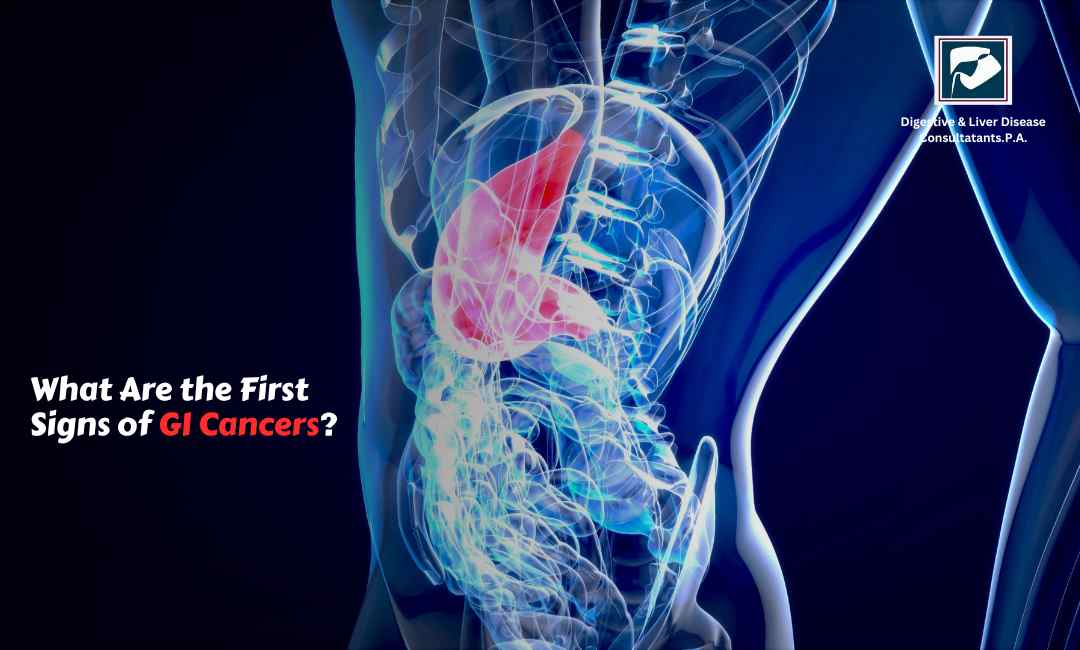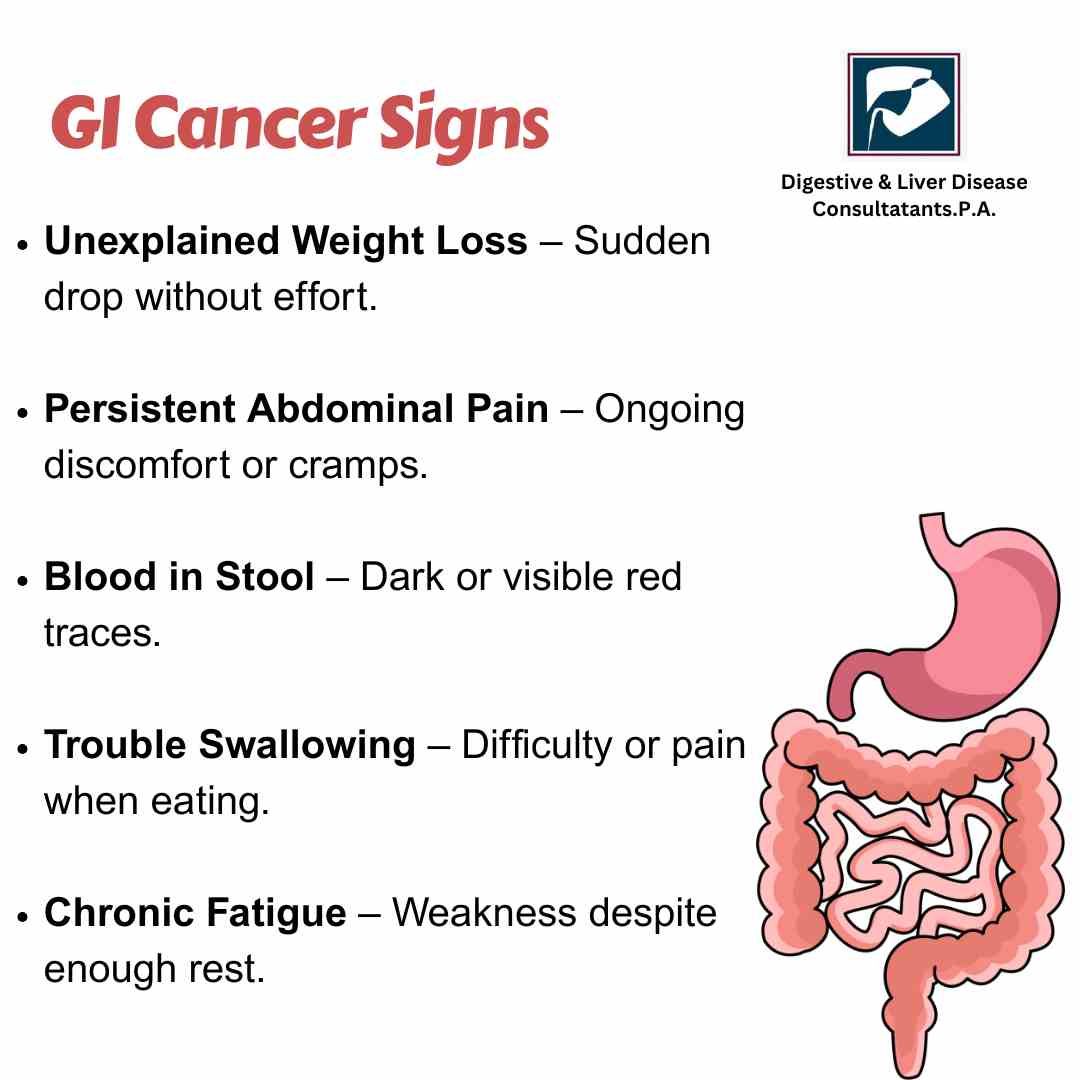Gastrointestinal (GI) cancers affect the digestive system, which includes the esophagus, stomach, liver, pancreas, colon, and rectum. These cancers often develop quietly and may not show obvious signs in the early stages. Recognizing the first symptoms is important because early detection of GI cancers can greatly improve treatment success and survival rates.
Many patients ignore mild digestive symptoms, thinking they are related to diet, stress, or common stomach issues. But sometimes, these early warning signs may indicate something more serious.
In this blog, we will explain the first signs of GI cancers, why they happen, and when you should see a gastroenterologist.
Why Early Detection Matters
GI cancers are among the most common cancers in the United States. Colon cancer alone is one of the leading causes of cancer-related deaths, but it is also one of the most preventable when found early through screening.
The challenge is that many digestive cancers start with subtle symptoms. By the time they cause severe pain or weight loss, the cancer may have already spread. Paying attention to early changes in your gut health and digestive system can help catch these cancers at a stage when treatment is more effective.
Common First Signs of GI Cancers
1. Unexplained Changes in Bowel Habits
Frequent diarrhea, constipation, or narrow stools that persist for weeks may be an early sign of colon or rectal cancer. If these changes do not go away with diet or lifestyle adjustments, it is important to see a doctor.
2. Blood in Stool or Vomit
Blood in stool, whether bright red or dark and tarry, should never be ignored. Vomiting blood may indicate stomach or esophageal cancer. While not all cases are caused by cancer, these symptoms always require medical attention.
3. Difficulty Swallowing (Dysphagia)
Trouble swallowing solid foods or feeling like food gets stuck in your throat may be an early sign of esophageal cancer. This symptom often starts mildly and gets worse over time.
4. Unexplained Weight Loss
Losing weight without trying can be an early warning sign of cancers such as pancreatic, stomach, or liver cancer. Cancer cells can interfere with digestion and metabolism, leading to sudden weight loss.
5. Persistent Abdominal Pain or Discomfort
Ongoing pain, cramping, or bloating in the abdomen may signal cancers of the colon, stomach, pancreas, or liver. Unlike temporary indigestion, cancer-related discomfort does not improve with rest or over-the-counter medications.
6. Chronic Fatigue
Extreme tiredness that does not improve with sleep may result from internal bleeding caused by GI cancers. Low iron levels (anemia) are often the first clue that something serious is happening inside the digestive system.
7. Loss of Appetite or Feeling Full Quickly
Stomach and pancreatic cancers can cause early satiety, meaning you feel full after eating only a small amount. This symptom is often overlooked but can be an early indicator.
8. Yellowing of Skin or Eyes (Jaundice)
Jaundice is a common first sign of liver cancer or pancreatic cancer. It happens when a tumor blocks the bile ducts, leading to a buildup of bilirubin in the body.
Types of GI Cancers and Their Unique Symptoms
Esophageal cancer: Difficulty swallowing, chest pain, chronic heartburn.
Stomach cancer: Indigestion, nausea, bloating, vomiting blood.
Liver cancer: Jaundice, abdominal swelling, unexplained weight loss.
Pancreatic cancer: Back pain, jaundice, greasy stools, sudden diabetes diagnosis.
Colon and rectal cancer: Blood in stool, changes in bowel habits, persistent cramps.
Understanding these differences can help patients recognize patterns and seek help sooner.
Smarter Choices for Digestive Health
While not all GI cancers can be prevented, making healthier lifestyle choices can lower your risk:
- Eat a diet rich in fiber, fruits, vegetables, and whole grains
- Limit processed meats, red meats, and alcohol
- Maintain a healthy weight
- Stay physically active
- Quit smoking
- Go for recommended cancer screenings, including colonoscopy starting at age 45 (or earlier if you have risk factors)
When to See a Gastroenterologist
You should schedule an appointment with a gastroenterologist if you experience:
- Persistent changes in bowel habits
- Blood in stool or vomit
- Difficulty swallowing
- Abdominal pain that lasts more than a few weeks
- Unexplained weight loss or fatigue
Early medical evaluation can help distinguish between common digestive problems and something more serious like GI cancer.
About Digestive & Liver Disease Consultants, P.A.
At Digestive & Liver Disease Consultants, P.A., we are committed to providing expert care for patients with gastrointestinal and liver conditions. Our team of board-certified gastroenterologists uses advanced diagnostic tools and treatments to manage conditions ranging from acid reflux and irritable bowel syndrome to liver disease and gastrointestinal cancers.
We emphasize preventive care, including cancer screenings such as colonoscopy, to detect issues before they become life-threatening. Our mission is to help patients in the US achieve better digestive health and long-term wellness through compassionate, evidence-based care.
Conclusion
The first signs of GI cancers can be easy to overlook, but symptoms like blood in stool, difficulty swallowing, unexplained weight loss, and persistent abdominal pain should never be ignored. Recognizing these early warning signs and seeking medical care quickly can make a life-saving difference.
If you are experiencing ongoing digestive symptoms or are concerned about your risk of GI cancer, do not wait. Schedule an appointment with Digestive & Liver Disease Consultants, P.A. Our skilled and best gastroenterologists are here to provide personalized care, advanced screenings, and treatment options to protect your digestive and overall health.







